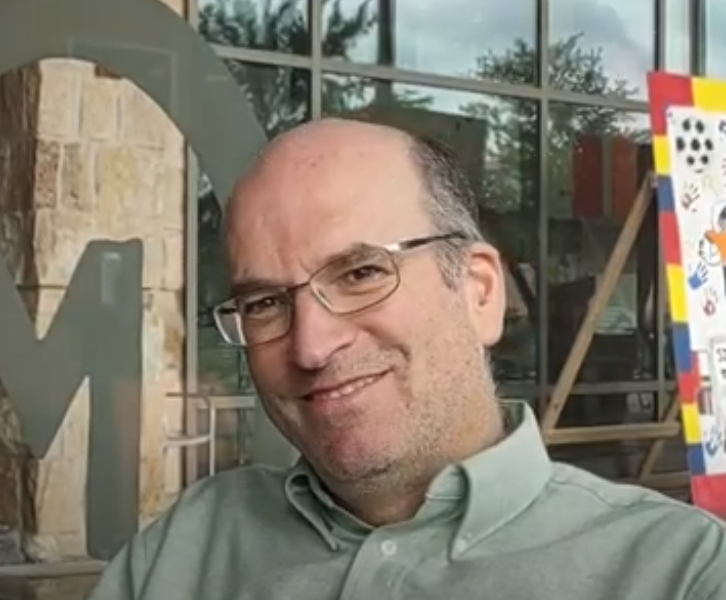
Life in the Oilfields – Flares and Earthquakes
Dr. Todd Richardson
Professor - University of Texas - Permian Basin
We want everyone out here to be safe and healthy and have a good, affordable source of energy and have good, well paying jobs. – Dr. Richardson
The following is an excerpt of an interview by Michael Lewis of Environment Texas with Dr. Richardson, a professor at the University of Texas – Permian Basin. The questions and responses have been edited for brevity and clarity.
This is part of our “Stories from the Oilfields” series of collected interviews from residents of the oil producing areas of Texas and experts on the impacts of the fossil fuel industry. See our full series HERE.
Environment Texas: So what brings you here to talk to us today?
Todd Richardson: Well, I have been very concerned about the changes that have been taking place over the 19 years that I’ve lived here, especially since this recent oil boom, hydraulic fracking and directional drilling.
The whole area has really opened up to oil exploration and production in some really remarkable ways, in ways that no one around here lived their whole lives here had never seen. You can even see the flares just driving between Odessa and Midland and the organic compounds that are that come out in the flaring and everything. It is adding dangerous pollutants into the atmosphere that we all have to breathe.
And then it’s also, too, the earthquakes that we’ve been having are definitely an area of concern to the point where people that you’ve seen just having random conversations, first couple of tremors happened, it was kind of a novelty, but not anymore. I mean, people were getting increasingly concerned about it.
Environment Texas: You mentioned the spoiling of nature. What exactly have you seen?
Todd Richardson: Well, where it used to be, you could drive out west of here and just wide open, beautiful landscape, and you know, few spots along the way where you’d see the drill sites and installations and so forth. But it’s just been ramped up 1000 fold in some areas. And now all that wide open country is filled with flares and it’s quite ugly. And it reminds you of something out of science, the way I joke about it. It’s like in The Lord of the Rings when the Orcs are massing against the people of the Men of Rohan or something like that. I mean, it’s that stark. You just feel like you’re in some kind of post apocalyptic kind of nightmarescape.
Environment Texas: I think it’s fair to say that the fossil fuel industry is the reason why Odessa and Midland exists. What would you tell those people who say, listen, this is how I put food on my table?
Todd Richardson: We know it’s hard work and it’s very much still necessary. I still have a furnace that burns natural gas and I have a car that’s a plug in hybrid but still burns some gas. And so of course, fossil fuels are still a necessity. However, I lived here for 19 years. I know people who work out in the oil fields and I know the kinds of chemicals and things that they’re exposed to, the concerns they’ve raised about exposure to hydrogen sulfide and other kinds of pollutants. And I’ve known plenty of people who’ve gotten sick. So when we advocate for a transition to a clean energy economy, it’s the kind of thing that’s going to benefit everyone, including people who depend on fossil fuels for their livelihood.
We want everyone to be healthy. We want everyone to have affordable energy. We want everyone to be working in a good, clean, safe, working environment. And the way the working environment is right now out here, my concern extends to people who work in the industry.
I’m very interested in seeing wind and solar continuing to accelerate out here, which is bringing a lot of new jobs out here that has definitely accelerated in the 19 years I’ve been here. I believe with wind and solar, that’s one way to help everyone who lives out here, including people who have spent their careers working for fossil fuels.
But even before that transition happens, we want people who are working out in the fields, out in the oil field, that we don’t want them breathing gas that’s coming out through methane leaks and all that. Because as we all know, it’s not just methane that’s leaking. It’s a lot of benzenes and all the other kinds of carcinogens that people are getting exposed to. So we want everyone out here to be safe and healthy and have a good, affordable source of energy and have good, well paying jobs.
Environment Texas: Are there any other effects that you feel that we haven’t covered?
Todd Richardson: Well, as you might imagine, a lot of the students, they are from the region for their families and everything that they are happy with what the oil industry has done in terms of providing livelihood for families and things like that. I’ve taken students on field trips to a number of Superfund sites in the area from leaks of hexavalent chromium. And I take students there to say this is kind of the dark side of oil production that maybe folks aren’t aware of quite as much. And I’ve had students say, oh, my gosh, I used to play out here when I was a kid, and so did my sisters. I’ve had students talk about concerns around the earthquakes. I’ve had students express concerns about loss of wildlife in some areas where they grew up.

